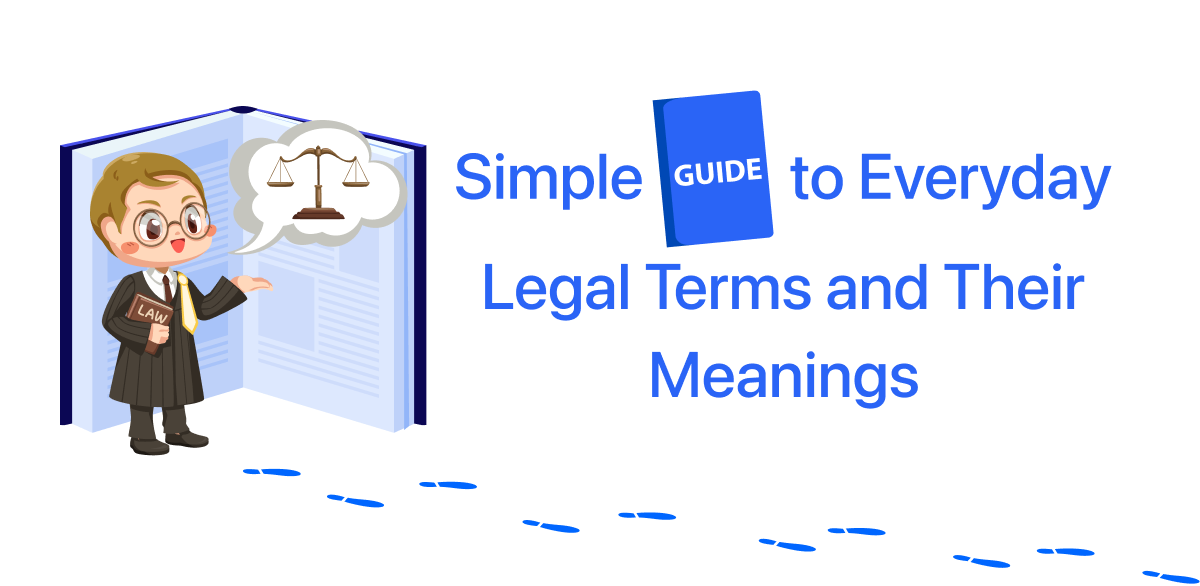Simple Guide to Everyday Legal Terms and Their Meanings
As much as courtroom dramas are getting in trend, people are often left confused by the terms that lawyers are using. With words like “subpoena,” “dismissal,” etc., popping up, the confusion scales up, and people are often left wondering what they mean. To keep up, some people also often search the web, but how effective is it really? Every time one hears a legal term, they can’t just stop it all and start searching.
Solving the hassle, here’s a dive into the Legalese – the most common yet confusing legal terms. Remember, they are not just the essence of the legal dramas, but also to help you at any instance you deal with any legalities. These words are the key to understanding contracts, court cases, legal letters, and more.
What exactly is the need for Legalese?
Legalese is the law’s version of terms prepared for precision. The terms help summarize complex ideas into a few words; this not only saves time but also helps reduce ambiguity in court or contracts.
Many terms in Legalese originate from Latin or ancient English and have roots in centuries of legal tradition. And while these seem crystal-clear to lawyers and are essential for consistency, critics often say that they alienate clients and the audience. Knowing these terms helps you understand legal documents, follow cases, or spot when you need a pro’s help.
Legal Lingo Decoded
Here is a list of the most common Legal lingo explained in everyday language.
1. Ab initio
It comes from Latin, meaning “from the beginning.” The term describes when a contract, marriage, or law first became valid. For example, if something is invalid ab initio, it was never legally binding, just like a fraudulently signed deal.
2. Accelerated rehabilitation
This refers to a program that lets first-time offenders avoid a conviction by completing certain conditions, like community service. As one finishes it successfully, the charges may be dismissed. It is just like a legal second chance.
3. Action
It refers to a lawsuit. When someone takes a dispute to court, like suing someone over a breached contract, it is called an action. Think of it as officially starting a legal battle.
4. Act
It refers to a law passed by a government body. Acts define the formal rulebook in the world of Law.
5. Actus reus
Originating from Latin, it means “guilty act.” The physical act of a crime, like stealing, is called Actus reus.
6. Adjudication
It means the process of a court resolving a dispute or deciding a case. It’s the judge’s final call after hearing both sides in a legal dispute.
7. Admissible
It means the evidence a court allows in a trial. If the evidence is inadmissible (like hearsay), it is not allowed by the court for a trial, no matter how compelling it seems.
8. Affidavit
It refers to a written statement that is sworn to be true under oath. It is signed by the involved parties in front of a notary or commissioner. It can also be used as evidence in court, and is just like a legally binding promise.
9. Alimony
It implies the money paid by one spouse to another (often the dependent in a relationship) after divorce or separation for financial support. It’s a lifeline to help someone transition after they split up.
10. Allegation
It refers to a claim or assertion made in a case that is yet to be proven. For example, alleging someone stole something starts the legal process.
11. Appeal
It is an act of asking a higher court to review a lower court’s decision for errors. An appeal is not a new trial, just a check for legal mistakes and to give a second chance to prove one’s innocence.
12. Appellant
It refers to the person appealing a court’s decision, hoping to overturn it.
13. Appellee
It refers to the person responding to an appeal, defending the original court’s ruling.
14. Arbitration
The word implies settling a dispute outside the court, where both sides agree to a binding decision made by a neutral arbitrator. It is just like a private courtroom for resolving business disputes.
15. Arrearages
It means overdue payments after losing a legal dispute or case, like unpaid child support or rent.
16. Bail
It refers to the money or a pledge one’s lawyer or knowns have to pay to release someone from jail while they await trial. It is like a security measure to make sure the accused will show up in court. If the accused skips the court, they lose the cash.
17. Bar
It means the legal profession or a barrier to a claim. It also refers to the exam lawyers pass to practice the law.
18. Bond
It is a financial guarantee, like bail or a surety bond, to ensure that someone accused of anything meets legal obligations. It’s just like a promise backed by cash.
19. Capias mittimus
It refers to a court order to arrest someone, specifically for failing to appear in court or pay a fine. It’s the law’s “go get ‘em” warrant.
20. Case
It refers to a legal dispute or criminal charge brought to the court. It includes the whole process, from filing to resolution of the dispute.
21. Charge
It refers to a formal accusation of a crime (for example, theft) or a financial obligation.
22. Chattels
It refers to movable personal property, like cars or jewelry, that can be picked up and taken away as required by the owner, unlike land or buildings.
23. Claim
It refers to the demand for something (for example, money or rights) in a lawsuit. It’s what the plaintiff says they’re owed.
24. Consideration
It refers to something of value (for example, money, services, a promise) exchanged in a contract to make it valid. A lack of consideration can make the contract invalid.
25. Contract
It refers to a legally binding agreement having clear terms and mutual consent of the parties involved. For example, leases, sales, or job agreements are all contracts.
26. Conviction
It refers to a court’s ruling that someone is guilty of a crime.
27. Custody
It means legal responsibility for someone (for example, a child in case of divorce cases) or being held in jail pre-trial. It is all about having complete control or care responsibilities for an individual.
28. Declaration
It is a formal statement of facts or claims in a lawsuit, like someone’s opening move in a court case or dispute.
29. Defendant
It refers to the person or entity sued or accused in a case. The defendants are required to defend against the prosecutor’s claims.
30. Deposition
It is a sworn testimony taken outside court, recorded to be used during the trial in a case. It’s like a pre-trial interview under oath.
31. Discovery
It is the pre-trial phase where both sides exchange all the acquired info, documents, and evidence.
32. Dismissal
It refers to the instance when a court ends a case without a full trial. It could be due to weak evidence or a settlement.
33. Dispose
It is the process of resolving or closing a case, like settling or dismissing it. It’s the court’s way of saying, “We’re done here.”
34. Domicile
It refers to your permanent legal home that also help determine which laws apply to you (for example, taxes or inheritance). It’s the origin where your roots are.
35. Due diligence
This means the reasonable steps taken to investigate or verify something, like checking a property before buying. It’s exactly like a legal homework.
36. Ejectment
It means a lawsuit to recover property from a person wrongfully occupying it.
37. Emancipation
It is the process of legally freeing a minor from parental control while making them an adult in the eyes of the law.
38. Eviction
It is the act of forcibly removing a tenant from a property for violating a lease or not paying rent.
39. Evidence
Anything (for example, documents, testimony, and objects) that can be used to prove or disprove facts in court for a case.
40. Felony
It refers to a serious crime (for example, murder, robbery) with heavy penalties, like over a year in prison.
41. Filing
It refers to submitting legal documents (for example, a complaint) to a court to start or continue a case. It’s the paperwork to get started with a case or trial in the court.
42. Foreclosure
When a lender takes back property (for example, a house) because the borrower didn’t pay the mortgage, it is called as a foreclosure.
43. Foreman
It refers to the jury member who leads deliberations and speaks for the group in court. They can also be seen as the captain of the jury’s team.
44. Grievance
It refers to a formal complaint, often about unfair treatment, like in a workplace or legal process.
45. Hearsay
It is the secondhand info a witness heard but didn’t see. Usually this is not admissible as an evidence in court as it is too unreliable, like a gossip.
46. Incarceration
It means being locked up in jail or prison, mainly as the legal consequence of a conviction or pre-trial detention.
47. Indigent
It refers to someone who is unable to afford a lawyer or court fees. Such personnels are often eligible for free legal aid.
48. Infraction
It means a minor offense, like a traffic ticket, with light penalties (for example, a little fine).
49. Injunction
This is a court order to do or stop doing something, like halting a project. If you disobey an injunction, you could get in some serious trouble.
50. Jurisdiction
It refers to a court’s authority to hear a case, based on location, case type, or amount. For example, a Singapore court can’t rule on a Tokyo dispute as that dispute is out of its jurisdiction.
51. Juror
It refers to a member of a jury, who decides facts in a trial. They’re the citizen judges weighing evidence.
52. Juvenile
It refers to a minor (usually under 18) involved in a legal case. Juvenile cases are often handled in special courts and have comparatively lighter consequences.
53. Liability
It is a legal responsibility for harm or debt. For example, if you’re liable for anything, you’re on the hook to fix it.
54. Litigation
It is the process of taking a dispute to court, from filing to judgment. It’s the full lawsuit journey, often slow and pricey.
55. Magistrate
It refers to a lower-level judge who mainly handles minor cases or preliminary hearings.
56. Mandamus
It is a court order that forces a public official to do their job, like making a clerk issue a permit.
57. Marshal
It refers to a court officer who helps enforce orders, like serving papers, or maintains courtroom order.
58. Mediation
It is a process of resolving disputes where a neutral mediator helps both sides negotiate a deal.
59. Motion
It is a request to a judge for something. For example, a motion to dismiss a case.
60. Movant
It refers to the person who makes a motion in the court. They’re the ones who push for a specific action or ruling.
61. Nolle
It is short for the Latin phrase, nolle prosequi. It is the instance when a prosecutor drops a case before trial.
62. Notarize
It is the process of having a notary verify a document’s authenticity by witnessing a signature.
63. Oath
It is a promise to tell the truth during a trial in court or while signing an affidavit.
64. Order
It is a formal directive of a court. For example, granting custody or dismissing a case.
65. Parole
It is the early release of a convict from prison under supervision. If the person on parole violates the terms, they’re back behind bars.
66. Petition
It is a formal written request to a court for action, for example, filing for divorce. It’s how you ask the court to step in.
67. Plaintiff
The person starting a civil lawsuit and making a claim that they’ve been wronged is known as a plaintiff. They’re the accuser in a case or dispute.
68. Plea
A defendant’s formal response to a criminal charge (for example, guilty, not guilty). It’s their official stance in court for a case.
69. Precedent
It is a past court decision that guides similar cases. It’s the law’s way of staying consistent.
70. Perjury
It refers to lying under oath in court or a sworn document. It’s a crime and has serious penalties.
71. Prosecute
It is the process of bringing criminal charges against someone and pursuing the case in court.
72. Record
The official written account of a case, including filings, testimony, and rulings, comes under a record.
73. Respondent
The person responding to a legal action, like in an appeal or petition, is known as a respondent.
74. Restitution
It is the money paid to a victim to compensate for harm or loss, often ordered in criminal cases. It’s to help make things right.
75. Seal
It is an act to restrict access to court records, keeping them private. Sealed cases are off-limits to the public.
76. Sentences
It is the punishment a court gives a convicted person, like jail or fines. It’s the consequence of guilt.
77. Statute
It is a written law passed by a legislature. It’s the rulebook for everything from taxes to traffic.
78. Stipulation
It is an agreement between parties in a case, like admitting a fact to skip a fight. It’s just like a legal handshake.
79. Subpoena
It refers to a court order to testify or produce documents. If one ignores it, they’re risking contempt of court.
80. Summon
It is an order to appear in court, often for a defendant or witness. It’s the court’s “you’re needed” note.
81. Testimony
It refers to the sworn statements given in court by a witness.
82. Title
It is a legal ownership of property, like a car or a house. It’s the document proving the specified property is yours.
83. Tort
It refers to a civil wrong (for example, negligence, defamation) causing harm, for which you can sue. It’s not a crime, but it’s still wrong.
84. Violation
It refers to breaking a law or rule, often minor (for example, a parking ticket).
85. Visitation
It refers to the court-ordered time a non-custodial parent spends with their child. It’s about keeping family ties strong.
86. Witness
It is someone testifying in court about what they saw or know. They’re the ones sharing the facts.
87. Writ
It is a formal court order directing someone to do something; it is just like a law’s command.
Final Words
These were some of the most commonly used legal terms – Legalese that you may come across in dramas, while reading contracts, following court cases, etc. These terms are not just a part of the lawyers’ talk, but also the key language of knowing and understanding your rights and protections.




